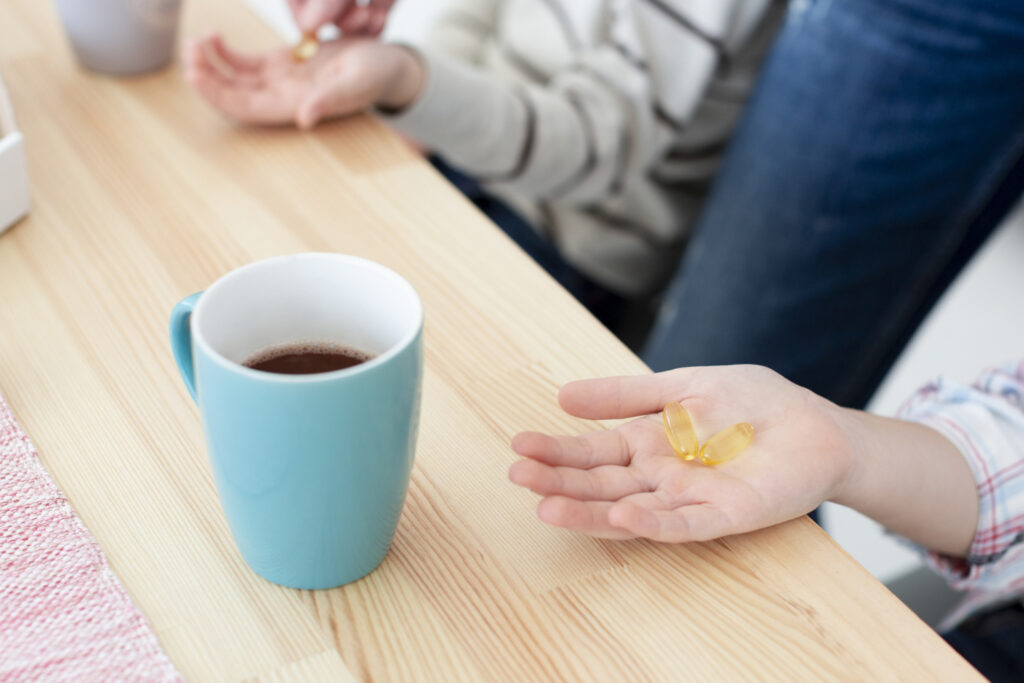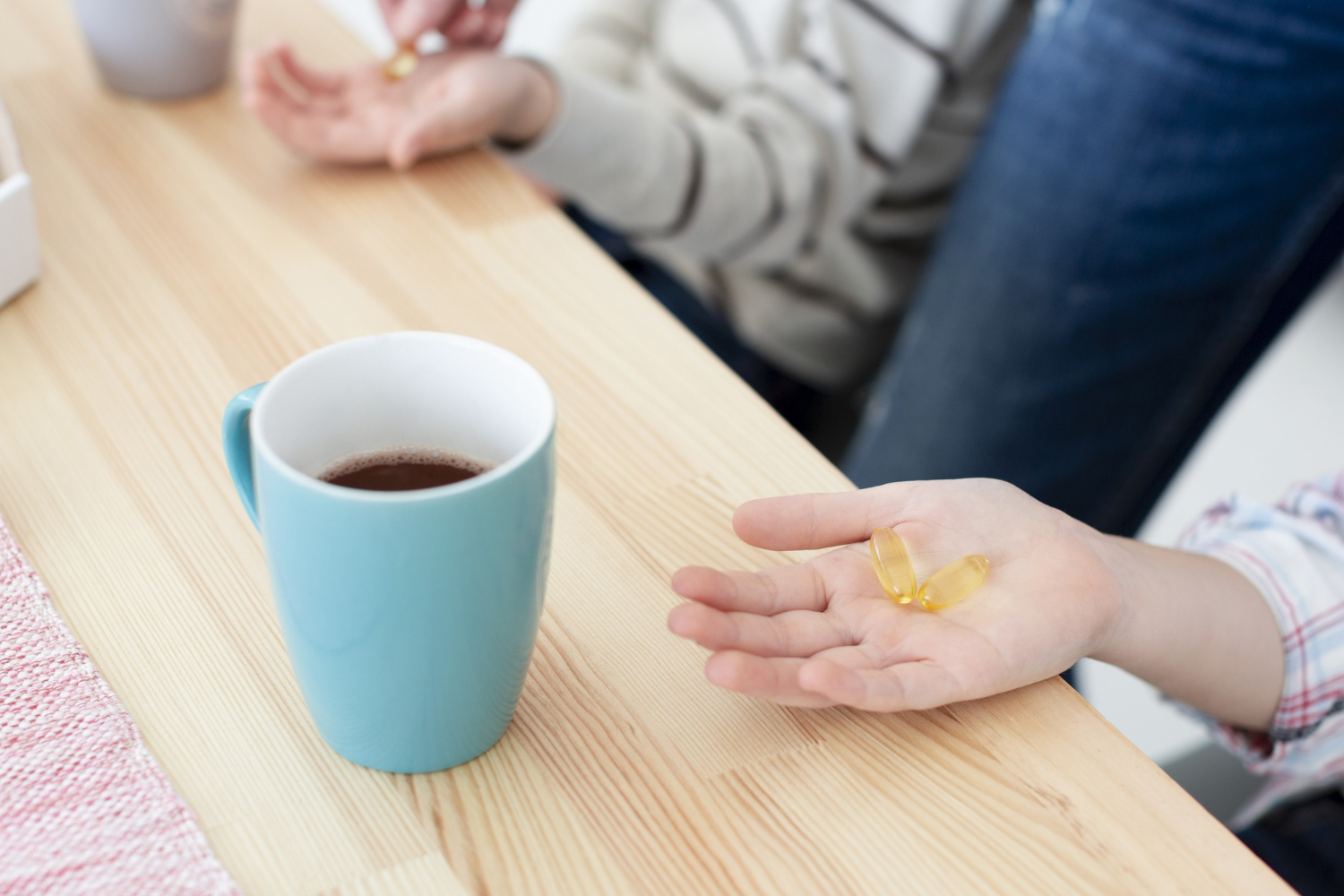
Overview
Coffee is one of the most popular beverages worldwide, enjoyed for its energizing effect, rich taste, and role in social rituals. Known for its caffeine content, coffee provides a quick energy boost, increases alertness, and can even enhance mood. However, as comforting and beneficial as a daily coffee routine can be, few people consider how caffeine may interact with the medications they take.
For individuals on specific medications, this oversight can lead to significant issues, including reduced drug effectiveness, unexpected side effects, or even serious health risks. This article explores the complex relationship between caffeine and various medications, outlining which drugs should not be mixed with coffee and how to time your caffeine intake for optimal health.
How Caffeine Affects the Body
Caffeine is a natural stimulant that primarily affects the central nervous system. By blocking adenosine receptors in the brain, it reduces feelings of drowsiness, providing an energy boost and increasing alertness. However, caffeine’s stimulating effects extend to the cardiovascular system (increasing heart rate and blood pressure) and the gastrointestinal tract, which can impact how the body absorbs and metabolizes medications. For people taking certain types of medication, these effects can disrupt the therapeutic actions of their drugs and lead to adverse reactions.
Let’s look at some common types of medications that can interact negatively with caffeine, followed by best practices for safe consumption
Table of Contents
Medications You Should Avoid Mixing with Coffee
Thyroid Medications
- Medication Example: Levothyroxine
People with hypothyroidism often rely on thyroid medications like levothyroxine to regulate their hormone levels. Caffeine, however, can interfere with the absorption of these drugs by affecting stomach pH levels. When taken together, caffeine may bind with the medication, reducing its absorption in the body and lowering its effectiveness. For individuals managing a thyroid condition, this can mean persistent symptoms or the need for higher medication doses.
- Safe Practice: Wait at least 30-60 minutes after taking thyroid medication before consuming coffee to allow for maximum absorption
Related : Signs and symptoms of gum cancer
Cold and Allergy Medications
Medication Example: Pseudoephedrine
Many cold and allergy medications contain stimulants like pseudoephedrine, which help relieve symptoms by narrowing blood vessels and reducing nasal congestion. Combining these with caffeine can result in heightened stimulant effects, leading to symptoms such as jitteriness, restlessness, and increased heart rate. This can be especially concerning for individuals with heart conditions or those sensitive to stimulants.
- Safe Practice: Space out coffee consumption by several hours when using stimulant-based cold and allergy medications.
Diabetes Medications
Medication Examples: Insulin, Metformin
Caffeine can impact glucose metabolism and insulin sensitivity, potentially raising blood sugar levels in some individuals. For people with diabetes, this effect can counteract the blood sugar-lowering effects of their medication. Metformin and insulin, in particular, may become less effective if caffeine interferes with the body’s natural glucose regulation, complicating diabetes management.
- Safe Practice: Monitor blood sugar levels closely if consuming caffeine, and consult a doctor to determine safe caffeine limits.
Alzheimer’s and Dementia Medications
Medication Examples: Donepezil, Rivastigmine
Drugs used to manage Alzheimer’s disease, such as donepezil, work by preserving acetylcholine, a neurotransmitter that plays a crucial role in memory and cognitive function. Since caffeine has its own stimulating effects on the brain, it may interfere with the actions of these medications, reducing their cognitive benefits. Additionally, caffeine may heighten side effects such as restlessness, dizziness, or headaches.
- Safe Practice: Limit caffeine intake and avoid coffee shortly before or after taking dementia medications to maintain mental clarity and medication efficacy
Related : Foods to Eat When You Have the Flu
Asthma Medications
Medication Examples: Theophylline, Albuterol
Asthma medications, especially those containing theophylline, are bronchodilators that help open the airways in the lungs. Since caffeine also acts as a mild bronchodilator, consuming it with asthma medications can intensify side effects like nervousness, palpitations, and nausea. This effect is particularly pronounced in individuals sensitive to caffeine or those on higher doses of theophylline.
- Safe Practice: Avoid caffeine close to your medication schedule and consult your doctor to understand safe caffeine levels while on asthma medications.
Antipsychotic Medications
Medication Examples: Clozapine, Olanzapine
Antipsychotic drugs, such as clozapine and olanzapine, are prescribed to help regulate neurotransmitter levels in the brain, often for conditions like schizophrenia or bipolar disorder. Caffeine can affect the metabolism of these medications, potentially lowering their effectiveness and leading to heightened symptoms. For patients managing mental health conditions, this interaction may disrupt mood stability and medication effectiveness.
- Safe Practice: Discuss caffeine intake with your healthcare provider, as they may recommend limiting or timing coffee consumption to maintain mental health stability.
Blood Pressure Medications
Medication Examples: Atenolol, Amlodipine
Individuals taking blood pressure medications may experience higher blood pressure and heart rate spikes if they consume caffeine too close to their medication. Since caffeine can cause a temporary rise in blood pressure, it can counteract the therapeutic effects of antihypertensive drugs. For those at risk of heart disease or stroke, this interaction could pose serious health risks.
- Safe Practice: Monitor blood pressure after consuming caffeine and consider limiting intake if you’re on antihypertensive medication.
Melatonin Supplements and Sleep Aids
Related : 10 Health Benefits of Coffee and Tea
Medication Examples: Melatonin, Zolpidem
Melatonin and sleep aids are designed to help you relax and prepare for restful sleep. Since caffeine stimulates the central nervous system and can disrupt the sleep cycle, consuming coffee before taking sleep aids may undermine their effectiveness, leading to insomnia or poor-quality sleep.
- Safe Practice: Avoid caffeine within six hours of bedtime or when taking melatonin to maximize sleep quality.
Medications to Be Cautious About with Coffee
- Pain Relievers (NSAIDs and Acetaminophen): Caffeine can increase the risk of gastrointestinal side effects when combined with NSAIDs.
- Antibiotics (Ciprofloxacin): This antibiotic can slow caffeine metabolism, causing jitteriness and overstimulation.
- Antidepressants (MAOIs): Caffeine may interact with MAOIs, increasing the risk of side effects such as high blood pressure.
- Bone Health Medications (Bisphosphonates): Caffeine may hinder calcium absorption, reducing the effectiveness of osteoporosis drugs
Tips for Safe Coffee Consumption with Medications
- Time Your Caffeine Intake: Wait 1-2 hours after taking medications to reduce the risk of interaction.
- Moderate Your Caffeine Levels: Limit intake to one or two cups per day if you’re on multiple medications.
- Explore Alternatives: Decaf coffee or herbal teas can provide a caffeine-free alternative for a hot beverage.
- Track Symptoms: Keep a journal to note any symptoms that arise after consuming caffeine with your medication.
The Takeaway
Caffeine is a potent substance that affects many bodily functions, making it crucial to understand how it interacts with your medications. By timing your coffee intake, monitoring your body’s responses, and consulting with healthcare professionals, you can enjoy coffee while minimizing potential health risks. Always prioritize safety and make adjustments to ensure that both your coffee habit and your medications work harmoniously for your health.
Frequently Asked Questions
- Why is it risky to drink coffee with certain medications?
Coffee contains caffeine, a stimulant that affects the central nervous system, heart rate, and blood pressure. Caffeine can interfere with how some medications are absorbed, metabolized, or how they work in the body, which may reduce their effectiveness or cause unwanted side effects.
- How long should I wait to drink coffee after taking my medication?
It’s generally advised to wait at least 1 to 2 hours after taking medications before drinking coffee. However, the optimal time may vary depending on the specific medication, so consulting your healthcare provider for personalized guidance is recommended.
- Which medications are most affected by caffeine?
Caffeine can interact with various types of medications, including thyroid medications, diabetes medications, certain blood pressure drugs, antipsychotics, asthma medications, and sleep aids. These interactions can reduce drug effectiveness or amplify side effects.
- Can I drink decaf coffee instead of regular coffee with my medication?
Decaf coffee contains significantly less caffeine, which may reduce the risk of interactions, but it’s not completely caffeine-free. For individuals highly sensitive to caffeine, it’s still wise to time even decaf consumption appropriately or explore caffeine-free alternatives like herbal teas
- Does caffeine interact with over-the-counter medications too?
Yes, caffeine can interact with some over-the-counter (OTC) medications, especially those containing stimulants like pseudoephedrine (found in cold medicines) or NSAIDs (pain relievers) like ibuprofen, as it can increase side effects or counteract the medication’s intended effects.
- Is it safe to stop drinking coffee if I’m taking medications that interact with caffeine?
Abruptly stopping caffeine can lead to withdrawal symptoms, including headaches, irritability, and fatigue. If you need to limit or stop coffee for health reasons, consider gradually reducing your intake over a period of days to ease the transition












